 Petzlover
Petzlover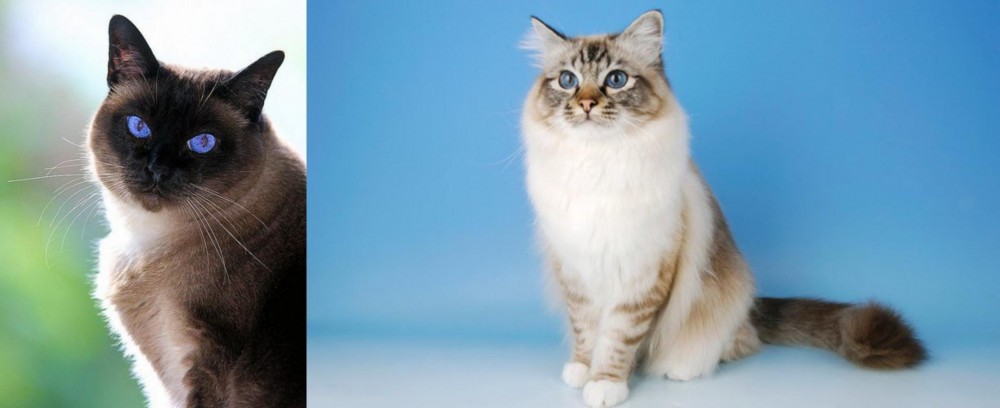 Applehead Siamese is originated from Thailand but Birman is originated from France. Both Applehead Siamese and Birman are having almost same weight. Applehead Siamese may live 10 years more than Birman. Both Applehead Siamese and Birman has same litter size. Applehead Siamese requires Low Maintenance. But Birman requires Moderate Maintenance
Applehead Siamese is originated from Thailand but Birman is originated from France. Both Applehead Siamese and Birman are having almost same weight. Applehead Siamese may live 10 years more than Birman. Both Applehead Siamese and Birman has same litter size. Applehead Siamese requires Low Maintenance. But Birman requires Moderate Maintenance
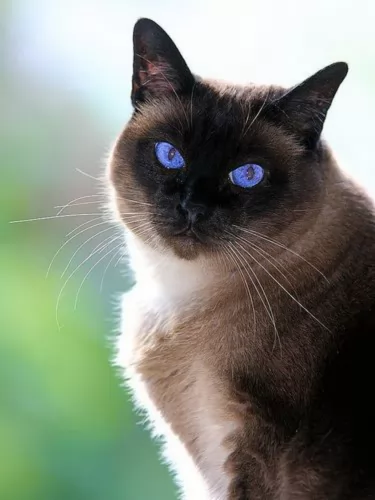 As the traditional Siamese cats from Siam, now known as Thailand, this ancient breed of cat goes back to 1350AD. It is believed that these Traditional Siamese cats were first exported to the west in the 19th century.
As the traditional Siamese cats from Siam, now known as Thailand, this ancient breed of cat goes back to 1350AD. It is believed that these Traditional Siamese cats were first exported to the west in the 19th century.
The Applehead is a Siamese cat that looks the way Siamese looked when they were first brought out to the United States in the 19th century. Breeding with other cat breeds is what developed the Applehead Siamese.
The Applehead seal point was also imported to Britain. Breeders have developed other point colors and head shapes by cross-breeding long- and short hairs, but all Siamese are essentially bred from the Applehead seal point.
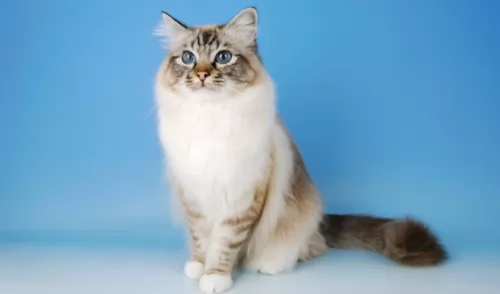 There isn’t clarity as to this exquisite cat’s origins. Many people believe they originated as the companions of temple priests in northern Burma.
There isn’t clarity as to this exquisite cat’s origins. Many people believe they originated as the companions of temple priests in northern Burma.
The cats somehow found their way to France, and it is believed that they have been in France since the 1920s.
The cats nearly disappeared during World War II, but luckily the remaining Birmans that survived were crossed with Siamese and Persians to strengthen the breed. In the early 1950s, pure Birnam litters were produced. It was in about 1959 that Birmans were brought to the United States.
The cats were also recognized in Britain in 1965 and in 1966 by the CFA. The first Birman cats were seal point but later other colors were brought in such as red, chocolate, and tabby.
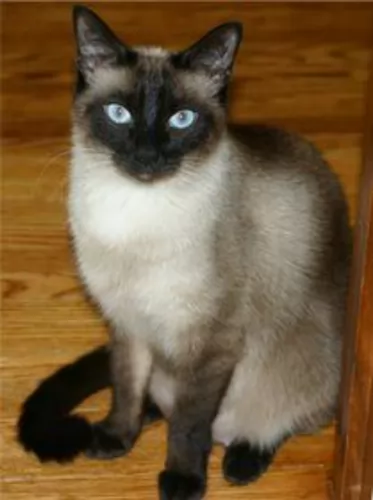 There is no denying that the very recognizable Siamese cats are one of the most popular cat breeds there are, known also for being very vocal.
There is no denying that the very recognizable Siamese cats are one of the most popular cat breeds there are, known also for being very vocal.
The female Applehead weighs between 3 and 5kg and the male might weight a bit more, as much as 6,8kg.
Siamese cats are all born white but as they mature they develop their deeper color points. There are actually 3 types of Siamese cats, with the Traditional Siamese being known as the Apple Head - the original breed of Siamese.
This particular Siamese is a bit bigger and larger-boned than the modern Siamese, with the body being more muscular and heavier. The head of the cat is fairly round- or apple-shaped with the eyes also being somewhat rounder than other types of cats.
The legs are long and the tail long too and the cat has a fairly short, silky coat.
These cats look intelligent and they are, so much so, that it will be important to present them with lots of toys that make them think and require some skills.
They also love receiving attention from their human owners and although they are also vocal, they don’t talk as much as the modern Siamese cats.
They're curious and playful and don’t like being left alone for too long. They also get on well with children and other pets in the home but are inclined to become more attached to one particular person, wanting to follow their favorite human around.
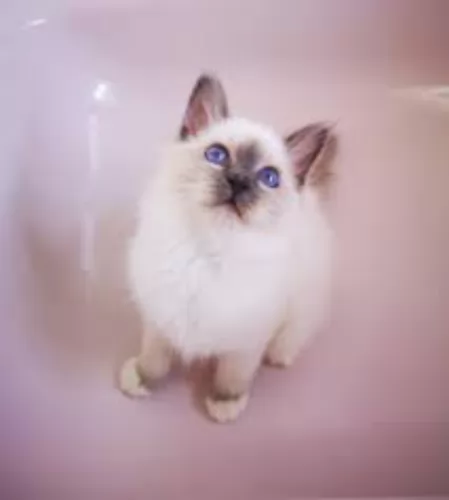 These are medium-sized cats which can become fairly large. They can weigh up to 4, 5 or 6kg. They are fairly heavily boned with a broad face and ears that are widely spaced.
These are medium-sized cats which can become fairly large. They can weigh up to 4, 5 or 6kg. They are fairly heavily boned with a broad face and ears that are widely spaced.
The round eyes are deep blue. The cat’s fur is medium-long and should be silky to the touch with no undercoat. Ther cat is a moderate shedder.
The base color is whitish to cream, but the kittens are always born white. Coat color, whether red, cream, or chocolate is always pointed and the cat always has the white paws.
The Birman isn’t as outgoing as some of the other cat breeds and its a quiet, docile intelligent cat that attaches itself to one particular family member. They can actually become jealous of their human companion and demand their attention.
These friendly cats are wonderful choices for families with children and dogs. They are calm and affectionate, and softly spoken, quietly letting you know when it’s dinner time and enjoying just being around his human family.
He is able to get along well with kids and other pets in the home. He can become quite playful too and because he is so intelligent, you can buy him some toys that require him to think.
 Applehead Siamese cats are very friendly and loving pets. They are intelligent and very beautiful too, with their amazing blue eyes.
Applehead Siamese cats are very friendly and loving pets. They are intelligent and very beautiful too, with their amazing blue eyes.
You will enjoy their friendship as they are prepared to become totally devoted to you, and of course, your playful cat will provide you with lots of laughs and entertainment too. The Applehead Siamese is known to make a splendid pet for you and once you've owned one, you'll think twice before getting another cat breed.
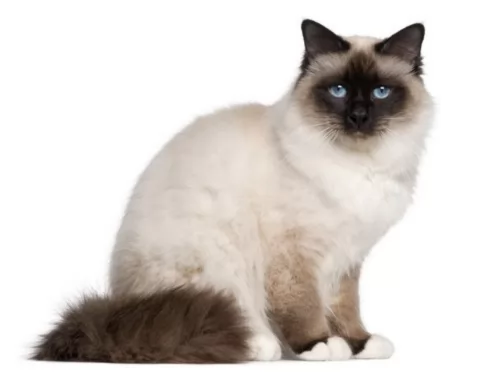 The Birman cat has to be one of the most beautiful cats there are, but the cat isn’t only a beautiful cat, it has wonderful characteristics as well.
The Birman cat has to be one of the most beautiful cats there are, but the cat isn’t only a beautiful cat, it has wonderful characteristics as well.
It is a loving, affectionate cat with his human family, loving to spend time around them. Playful and healthy, when you bring this most wonderful cat into your home, it will be as though an angel has come to stay.
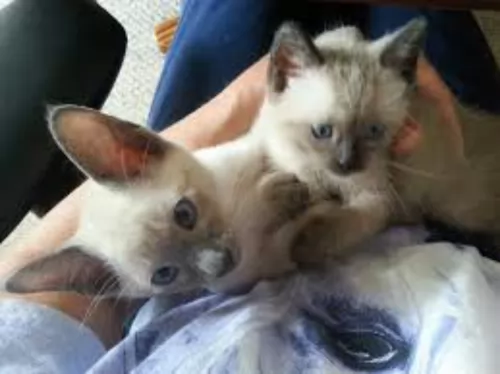 These are a healthy breed of cat and they have always been known to live longer than the modern Siamese cats.
These are a healthy breed of cat and they have always been known to live longer than the modern Siamese cats.
With good care they can live to be up to 20 to 25 years of age. Good nutrition and a loving environment can help to eliminate diseases that the Siamese might have to endure. Some of these can be a blockage in the stomach, skin cancer, feline diabetes, hip dysplasia, and disrupted visual pathway which causes a squint.
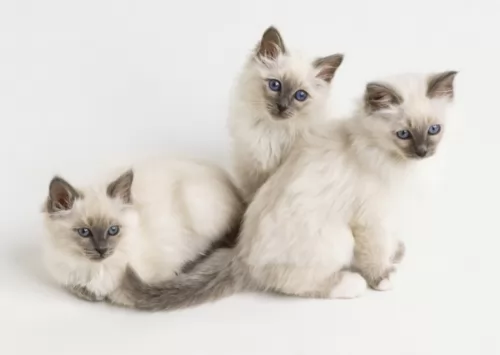 With good health your Birman can reach up to 13 years of age. With the Birman, the most serious illness is feline hypertrophic cardiomyopathy which also happens to be the most common heart disease in cats.
With good health your Birman can reach up to 13 years of age. With the Birman, the most serious illness is feline hypertrophic cardiomyopathy which also happens to be the most common heart disease in cats.
It’s a progressive disease and can result in heart failure. The cats are also at risk of developing feline infectious peritonitis.
Also, because this is a larger cat and a stocky kind of breed, it can easily put on weight and then become overweight. Strict attention will need to be given to diet as well as daily exercise.
Also, look out for Corneal dermoid - skin and hair on the surface of the cornea in one eye or in both. Luckily this is an eye problem that can be surgically corrected.
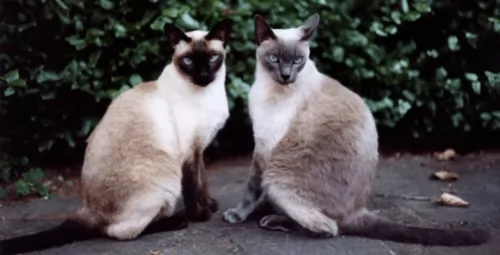 These cats have special nutritional needs and you want to be aware that obesity is a growing problem with modern-day cats. Make sure your Applehead has a healthy diet to maintain a healthy weight so that he keeps his lithe, lean looks.
These cats have special nutritional needs and you want to be aware that obesity is a growing problem with modern-day cats. Make sure your Applehead has a healthy diet to maintain a healthy weight so that he keeps his lithe, lean looks.
You might want to try a little bit of homemade food to enhance your Siamese cat's commercial food which is a mix of top quality meat-based wet- and dry food. You can speak to your vet about feeding your Applehead Siamese because you want to know which food is best for such a cat.
These days the best cat food manufacturers make sure that their cat foods are made up of tasty ingredients such as real chicken and whole brown rice formulated with the right balance of vitamins and minerals to meet the dietary needs of every cat breed and the season of life they are in.
Because of the Siamese cat’s short hair with no undercoat, the cat requires less brushing than other cats.
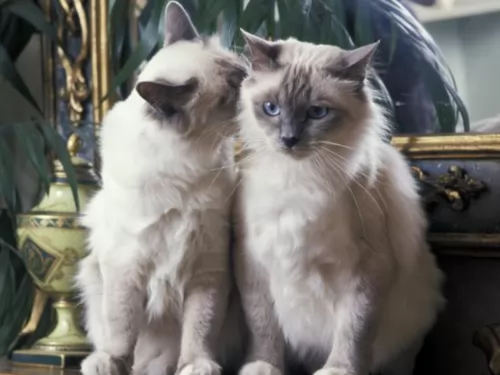 The Birman has a silky coat that sheds moderately so you want to give him a gentle brush once or twice a week to keep the coat of his soft and silky.
The Birman has a silky coat that sheds moderately so you want to give him a gentle brush once or twice a week to keep the coat of his soft and silky.
The Birman has a full topcoat, with no undercoat which means that you won’t have the coat matting or tangling.
He’ll need his nails trimmed and his teeth checked regularly. Your vet or professional groomers can do this for you and clean his teeth and check that there are no bad teeth making your pet sick.
The Birman cat has access to some great commercial cat food as there are some seriously good quality ones.
Many cat lovers choose cat foods that are AAFCO (Association of American Feed Control Officials) approved. It at least provides minimum standards for pet foods.
For your Birman you want to avoid artificial flavors and preservatives. Choose quality foods high in meat protein. As a carnivore, a cat has a huge need for meat protein. Get to know your pet food labels and choose foods with added taurine and vitamin A.